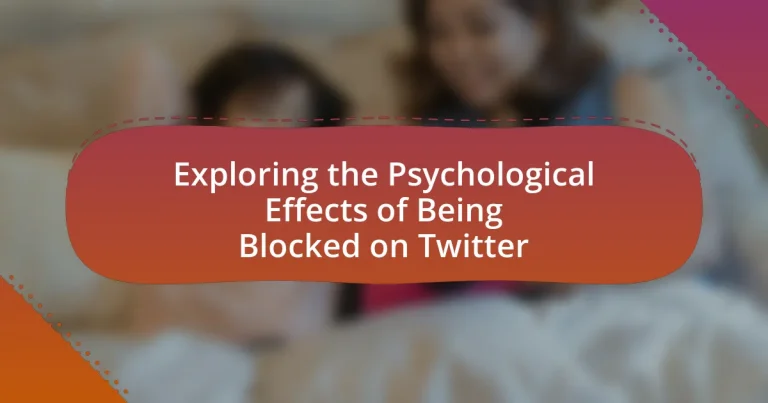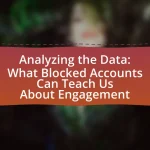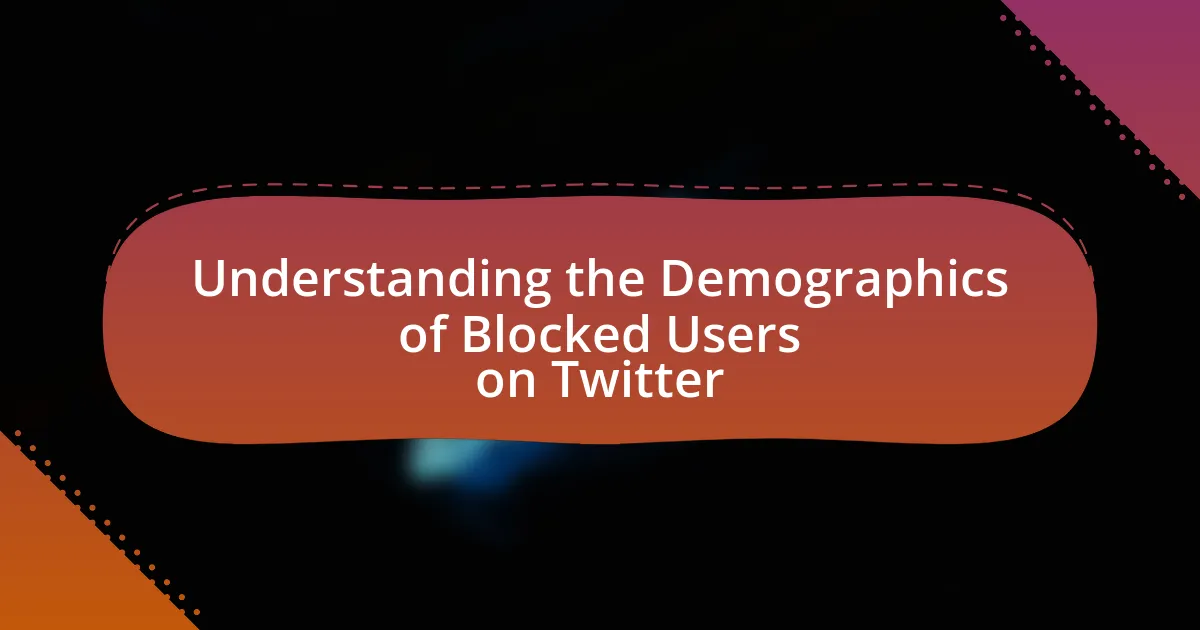The article explores the psychological effects of being blocked on Twitter, highlighting the emotional responses such as rejection, anxiety, and diminished self-esteem that users often experience. It discusses how social media interactions can significantly impact mental health, with research indicating that being blocked can lead to feelings of isolation and depression. The article also examines the motivations behind blocking, the varying experiences among users based on personality traits and demographics, and strategies for coping with the emotional fallout. Additionally, it addresses the social implications of being blocked and the importance of self-reflection and support systems in managing these experiences.
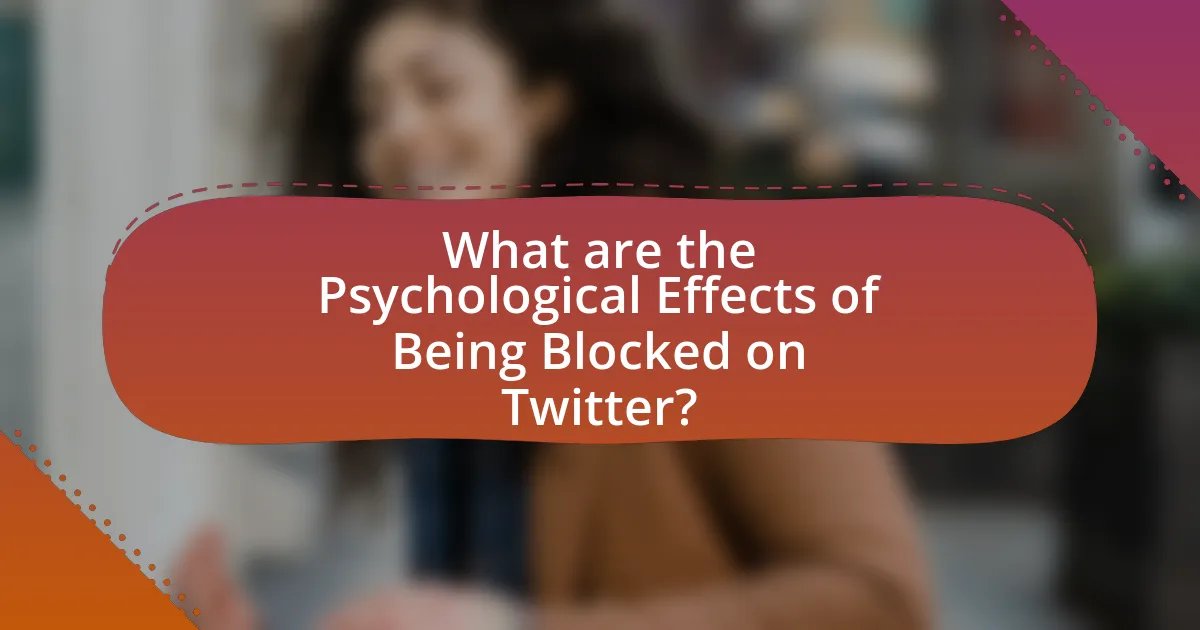
What are the Psychological Effects of Being Blocked on Twitter?
Being blocked on Twitter can lead to feelings of rejection, anxiety, and diminished self-esteem. Research indicates that social media interactions significantly impact emotional well-being; for instance, a study published in the journal “Cyberpsychology, Behavior, and Social Networking” found that negative experiences online, such as being blocked, can trigger emotional distress similar to real-life social rejection. This emotional response is often exacerbated by the public nature of social media, where users may feel their social standing is affected. Additionally, the act of being blocked can lead to rumination, where individuals repeatedly think about the reasons for the block, further intensifying feelings of inadequacy or confusion.
How does being blocked on Twitter impact an individual’s mental health?
Being blocked on Twitter can negatively impact an individual’s mental health by inducing feelings of rejection, isolation, and anxiety. Research indicates that social media interactions significantly influence emotional well-being, and being blocked can trigger a sense of loss or diminished self-worth. A study published in the journal “Cyberpsychology, Behavior, and Social Networking” found that social exclusion, such as being blocked, can lead to increased feelings of loneliness and depression. This emotional distress arises from the perceived social rejection and the disruption of social connections that individuals experience when they are blocked.
What emotions are commonly experienced after being blocked on Twitter?
Common emotions experienced after being blocked on Twitter include feelings of rejection, anger, confusion, and sadness. Individuals often perceive blocking as a personal affront, leading to feelings of rejection and hurt. Anger may arise from the perceived unfairness of the action, especially if the individual feels they did not deserve to be blocked. Confusion can occur when the reasons for being blocked are unclear, leaving individuals questioning their interactions. Additionally, sadness may stem from the loss of connection or the inability to engage with the blocked user. These emotional responses are supported by psychological studies indicating that social media interactions can significantly impact users’ emotional well-being.
How does the experience of being blocked differ among users?
The experience of being blocked on Twitter differs among users based on their emotional responses and the context of the blocking. Some users may feel relief or empowerment when blocked, viewing it as a means of self-protection from negativity or harassment, while others may experience feelings of rejection, confusion, or anger, particularly if the blocking comes from someone they respect or admire. Research indicates that emotional reactions can vary significantly; for instance, a study published in the journal “Cyberpsychology, Behavior, and Social Networking” found that individuals with higher levels of social anxiety often perceive blocking as a personal affront, while those with lower anxiety levels may interpret it as a necessary boundary. This variance highlights the subjective nature of online interactions and the psychological impact of being blocked.
Why do users block others on Twitter?
Users block others on Twitter primarily to manage their online experience and protect their mental well-being. This action is often taken in response to harassment, unwanted interactions, or exposure to negative content. Research indicates that blocking can serve as a coping mechanism, allowing users to create a safer and more positive environment on the platform. For instance, a study published in the journal “Computers in Human Behavior” found that individuals who experience online harassment are more likely to block users to regain a sense of control and reduce anxiety associated with negative interactions.
What are the common motivations behind blocking someone on social media?
Common motivations behind blocking someone on social media include protecting personal boundaries, preventing harassment, and managing emotional well-being. Individuals often block others to eliminate negative interactions, such as bullying or unwanted attention, which can lead to increased anxiety and stress. Research indicates that 40% of social media users have blocked someone due to feeling uncomfortable or threatened, highlighting the prevalence of this behavior as a coping mechanism. Additionally, blocking can serve as a way to curate one’s online environment, allowing users to maintain a positive and supportive digital space.
How does the context of the relationship influence the decision to block?
The context of the relationship significantly influences the decision to block by determining the perceived severity of interactions and the emotional investment in the relationship. For instance, individuals are more likely to block someone with whom they have a close relationship if they feel betrayed or threatened, as the emotional stakes are higher. Conversely, blocking may be less likely in casual relationships where the emotional impact is minimal. Research indicates that social dynamics, such as power imbalances and past conflicts, also play a crucial role in this decision-making process, as individuals assess the potential consequences of blocking on their social standing and emotional well-being.
What are the social implications of being blocked on Twitter?
Being blocked on Twitter can lead to significant social implications, including feelings of exclusion and diminished social capital. When an individual is blocked, they are effectively cut off from engaging with the blocker, which can result in a sense of isolation and rejection. This exclusion can impact one’s online identity and social interactions, as social media platforms often serve as critical spaces for connection and community building. Research indicates that social media interactions can influence self-esteem and mental well-being, suggesting that being blocked may contribute to negative emotional states such as anxiety or depression. Furthermore, the act of blocking can signal conflict or disagreement, potentially leading to broader social rifts within communities or networks.
How does being blocked affect one’s social identity online?
Being blocked on social media platforms like Twitter significantly impacts an individual’s social identity by altering their perceived social connections and status. When a user is blocked, they lose access to the blocked individual’s content and interactions, which can lead to feelings of exclusion and diminished self-worth. This exclusion can affect how others perceive the blocked individual, potentially leading to a negative shift in their online reputation. Research indicates that social media interactions are crucial for identity formation, and being blocked disrupts these interactions, reinforcing feelings of isolation and social rejection.
What role does public perception play in the experience of being blocked?
Public perception significantly influences the experience of being blocked on Twitter, as it shapes individuals’ emotional responses and social standing. When a user is blocked, they may perceive it as a public rejection, which can lead to feelings of shame, isolation, or anger, particularly if the block is from a person of influence or a peer group. Research indicates that social media interactions are heavily influenced by the visibility of actions; for instance, a study published in the journal “Cyberpsychology, Behavior, and Social Networking” found that users often experience heightened emotional distress when their social interactions are publicly scrutinized. This distress is compounded by the fear of being judged by others, as blocking can be interpreted as a social signal that affects one’s reputation and relationships within the online community.
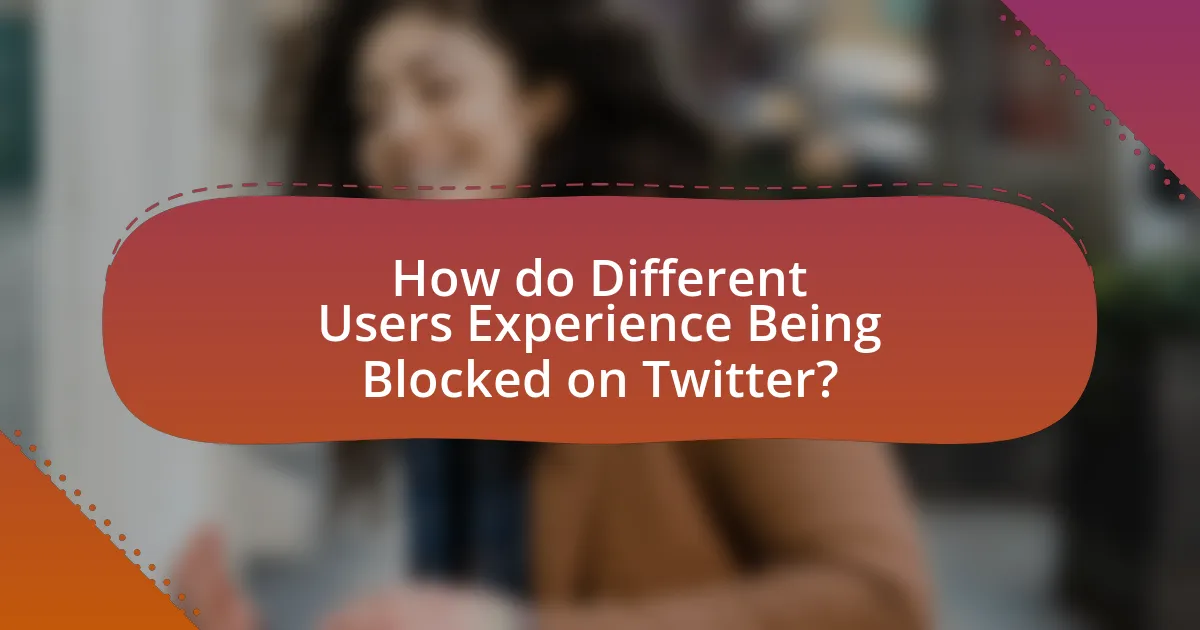
How do Different Users Experience Being Blocked on Twitter?
Different users experience being blocked on Twitter in varied ways, often influenced by their individual contexts and reasons for blocking. For instance, users who block others due to harassment may feel a sense of relief and safety, as blocking serves as a protective measure against unwanted interactions. Conversely, users who are blocked may experience feelings of rejection, confusion, or frustration, particularly if they do not understand the reasons behind the block. Research indicates that social media interactions can significantly impact emotional well-being; a study published in the journal “Cyberpsychology, Behavior, and Social Networking” found that negative online experiences, including being blocked, can lead to increased anxiety and decreased self-esteem. Thus, the psychological effects of being blocked on Twitter can vary widely, reflecting the complex nature of online social interactions.
What factors influence the psychological response to being blocked?
The psychological response to being blocked is influenced by factors such as the individual’s attachment style, perceived social support, and the context of the blocking event. Attachment styles, which shape how individuals relate to others, can lead to heightened feelings of rejection or abandonment when blocked, particularly in those with anxious attachment. Perceived social support plays a crucial role; individuals who feel supported by friends or community may experience less distress compared to those who feel isolated. Additionally, the context—such as the relationship with the blocker and the reasons for the block—can significantly affect emotional responses, with personal relationships often eliciting stronger reactions than casual interactions. Research indicates that social media interactions can amplify feelings of social exclusion, further influencing psychological outcomes.
How does the frequency of Twitter use affect emotional reactions to being blocked?
Frequent Twitter use intensifies emotional reactions to being blocked, as users often develop stronger attachments to their online interactions. Research indicates that individuals who engage with Twitter multiple times a day are more likely to experience feelings of rejection, anger, or sadness when blocked, compared to those who use the platform less frequently. This heightened emotional response is linked to the social validation and identity reinforcement that frequent users derive from their online presence, making the act of being blocked feel more personal and impactful.
What demographic factors contribute to varying experiences of being blocked?
Demographic factors such as age, gender, race, and social status significantly contribute to varying experiences of being blocked on Twitter. Research indicates that younger users, particularly those aged 18-29, are more likely to experience blocking due to their higher engagement levels and interactions on the platform. Gender differences also play a role, as studies show that women are more frequently blocked than men, often due to harassment or negative interactions. Additionally, racial and ethnic minorities may face unique challenges, as they are often subjected to targeted harassment, leading to a higher likelihood of being blocked. Social status influences these experiences as well; users with fewer followers may be blocked more often due to perceived lower influence or visibility. These factors collectively shape how individuals navigate their Twitter interactions and the psychological impact of being blocked.
How do different personality types respond to being blocked?
Different personality types respond to being blocked on Twitter in distinct ways. For instance, individuals with high neuroticism may experience heightened anxiety and frustration, often ruminating on the situation, while those with high extraversion might feel less affected, viewing it as a minor setback in their social interactions. Research indicates that personality traits significantly influence emotional responses; for example, a study published in the Journal of Personality and Social Psychology found that neurotic individuals tend to react more negatively to social exclusion, which includes being blocked. Conversely, agreeable individuals may respond with understanding or indifference, focusing on maintaining harmony rather than dwelling on the block. Thus, personality traits shape the emotional and behavioral responses to being blocked on social media platforms like Twitter.
What traits are associated with a stronger emotional response to being blocked?
Individuals with high levels of neuroticism and low self-esteem are associated with a stronger emotional response to being blocked. Neuroticism, characterized by emotional instability and anxiety, leads to heightened sensitivity to social rejection, which can amplify feelings of distress when blocked. Research indicates that individuals with low self-esteem may interpret being blocked as a personal failure or rejection, further intensifying their emotional reaction. A study published in the Journal of Social and Personal Relationships found that people who score high on neuroticism report more negative emotions in response to social media interactions, including being blocked.
How do introverts and extroverts differ in their reactions to being blocked?
Introverts and extroverts differ significantly in their reactions to being blocked on Twitter. Introverts may experience feelings of isolation and introspection, often reflecting on the reasons behind the block and how it affects their self-esteem. In contrast, extroverts are more likely to react with frustration or anger, viewing the block as a social affront that disrupts their engagement with others. Research indicates that introverts tend to internalize their emotions, leading to rumination, while extroverts externalize their feelings, often expressing them through social interactions or discussions with friends. This distinction highlights the varying emotional responses based on personality traits, influencing how each group copes with social media dynamics.
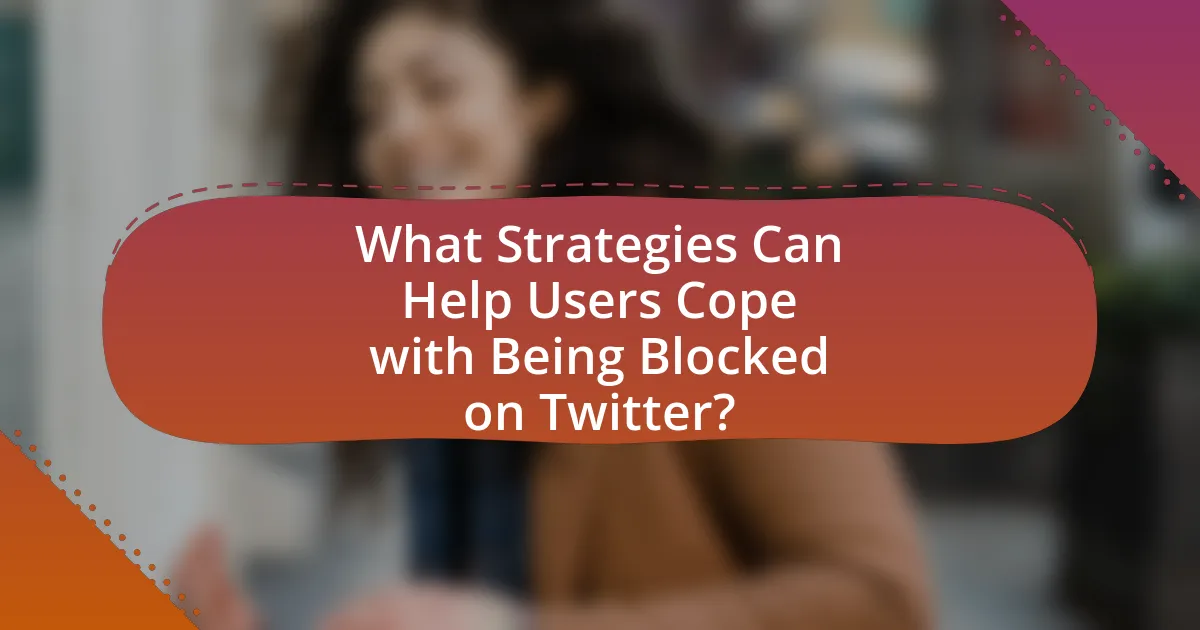
What Strategies Can Help Users Cope with Being Blocked on Twitter?
Users can cope with being blocked on Twitter by focusing on emotional resilience and reframing their perspective. Engaging in self-care activities, such as exercise or mindfulness practices, can help mitigate feelings of rejection or frustration. Additionally, users can seek support from friends or online communities to share their experiences and feelings, which can foster a sense of belonging and validation. Research indicates that social support is crucial for emotional well-being, as it can buffer against negative psychological effects (Cohen & Wills, 1985). By adopting these strategies, users can better manage the emotional impact of being blocked and maintain their mental health.
How can individuals manage their emotions after being blocked?
Individuals can manage their emotions after being blocked by engaging in self-reflection and practicing emotional regulation techniques. Self-reflection allows individuals to understand their feelings and the reasons behind their emotional responses, which can lead to greater emotional clarity. Techniques such as mindfulness meditation, deep breathing exercises, and journaling can help in regulating emotions by promoting relaxation and reducing anxiety. Research indicates that mindfulness practices can significantly decrease emotional distress and improve overall emotional well-being. For instance, a study published in the journal “Psychological Science” found that mindfulness meditation can enhance emotional regulation and resilience.
What coping mechanisms are effective for dealing with feelings of rejection?
Effective coping mechanisms for dealing with feelings of rejection include cognitive restructuring, social support, and self-compassion. Cognitive restructuring involves changing negative thought patterns associated with rejection, which can help individuals reframe their experiences and reduce emotional distress. Research indicates that individuals who engage in cognitive restructuring report lower levels of anxiety and depression following rejection experiences. Social support from friends and family provides emotional validation and can mitigate feelings of isolation, as studies show that strong social networks are linked to better emotional resilience. Lastly, practicing self-compassion allows individuals to treat themselves with kindness during difficult times, which has been shown to enhance emotional well-being and reduce the impact of rejection.
How can users reframe their perspective on being blocked?
Users can reframe their perspective on being blocked by viewing it as an opportunity for personal growth and boundary setting. Instead of perceiving being blocked as a personal rejection, users can recognize it as a chance to reflect on their interactions and understand the importance of healthy online boundaries. Research indicates that individuals who adopt a growth mindset in response to social media challenges, such as being blocked, report higher levels of emotional resilience and improved mental well-being. This perspective shift can lead to a more positive online experience and foster a greater understanding of interpersonal dynamics in digital spaces.
What best practices can users adopt to minimize negative experiences on Twitter?
To minimize negative experiences on Twitter, users should curate their feed by following accounts that promote positivity and unfollowing those that contribute to negativity. Research indicates that exposure to negative content can lead to increased anxiety and stress, highlighting the importance of a supportive online environment. Additionally, users can utilize the mute and block features to avoid interactions with accounts that engage in harassment or trolling, which can significantly reduce feelings of distress. Engaging in positive interactions, such as liking and retweeting uplifting content, can also foster a more enjoyable experience on the platform.
How can setting boundaries improve social media interactions?
Setting boundaries can significantly improve social media interactions by fostering healthier communication and reducing negative experiences. When individuals establish clear limits on what they will tolerate in online interactions, they create a more respectful environment that minimizes conflict and misunderstandings. Research indicates that users who actively manage their social media interactions, including blocking or muting accounts that engage in harmful behavior, report lower levels of anxiety and stress. This proactive approach not only protects mental well-being but also encourages more meaningful and positive exchanges with others, as users feel safer and more in control of their online experiences.
What role does self-reflection play in understanding the impact of being blocked?
Self-reflection plays a crucial role in understanding the impact of being blocked on Twitter by allowing individuals to analyze their emotional responses and behaviors. Through self-reflection, users can identify feelings of rejection, frustration, or confusion that arise from being blocked, which can lead to a deeper understanding of their social interactions and online identity. Research indicates that self-reflection enhances emotional intelligence, enabling individuals to process their experiences more effectively and recognize patterns in their online behavior. This understanding can facilitate personal growth and improve future interactions on social media platforms.
What resources are available for those struggling with the psychological effects of being blocked?
Resources available for those struggling with the psychological effects of being blocked on Twitter include mental health hotlines, online therapy platforms, and support groups. Mental health hotlines, such as the National Suicide Prevention Lifeline, provide immediate support and guidance for individuals experiencing distress. Online therapy platforms like BetterHelp and Talkspace offer access to licensed therapists who can help users process their feelings related to social media interactions. Additionally, support groups on platforms like Reddit or Facebook allow individuals to share their experiences and coping strategies with others facing similar challenges. These resources are essential for addressing the emotional impact of being blocked and fostering resilience in online environments.
How can professional help assist individuals dealing with social media-related issues?
Professionals can assist individuals dealing with social media-related issues by providing therapeutic support and strategies to manage emotional distress. Mental health professionals, such as psychologists and counselors, can help individuals process feelings of rejection or anxiety stemming from experiences like being blocked on platforms like Twitter. Research indicates that social media interactions can significantly impact self-esteem and mental well-being, with studies showing that negative experiences online can lead to increased feelings of loneliness and depression. By utilizing cognitive-behavioral techniques, professionals can guide individuals in reframing their thoughts and developing healthier coping mechanisms, ultimately fostering resilience in the face of social media challenges.
What online communities offer support for users affected by being blocked?
Online communities that offer support for users affected by being blocked include Reddit, specifically subreddits like r/Blocked, and Facebook groups focused on social media experiences. These platforms provide spaces for individuals to share their experiences, seek advice, and find solidarity with others who have faced similar situations. Research indicates that peer support in online communities can significantly alleviate feelings of isolation and distress associated with social media interactions, reinforcing the value of these communities for those affected by being blocked.
